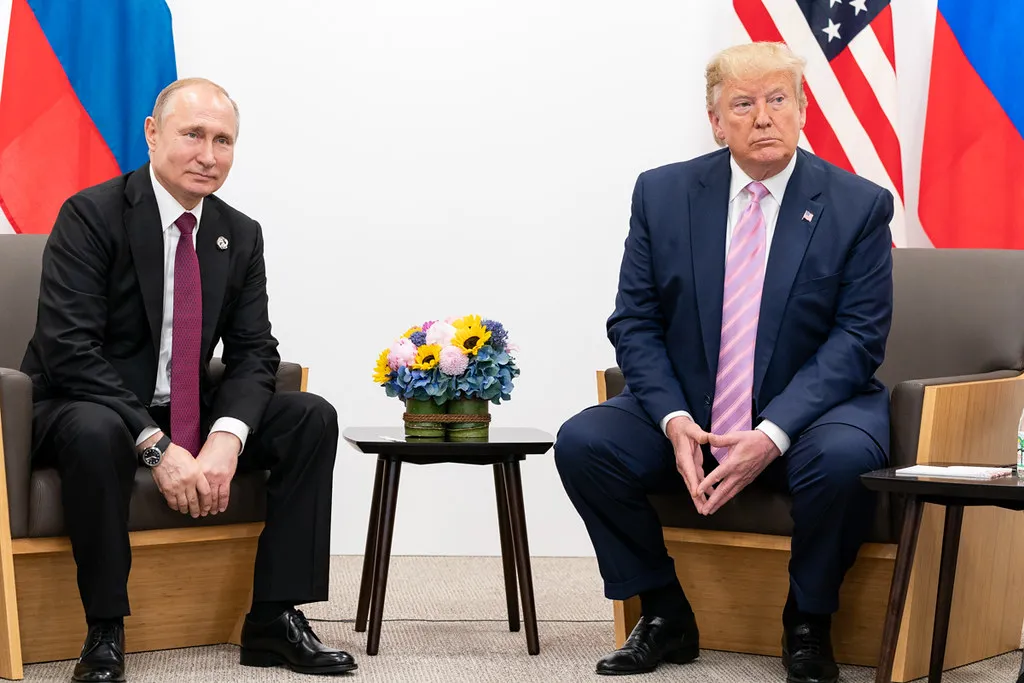Was it that easy? Russian President Vladimir Putin answered a question today, whether he would talk with U.S. President-elect Donald Trump; and he says he would. Then he adds that he is not above reaching out first to Trump. And an hour later, Trump says that he thinks the two of them will be talking.
It turns out that Putin, answering questions at the Valdai Discussion Club, thought that in Trump’s first presidency, “he was harassed by everyone on all sides, he was bullied, he was afraid of making a step to the left, to the right, saying the wrong thing”—and he ended up not in control of events. And Putin added: “I don’t know what’s going to happen now during his new presidency. Whatever he does is up to him.”
However, he offered that he learned something about Trump when an assassin tried to kill him in Pennsylvania: “I can tell you: his behavior at the time of the attempt on his life … it made an impression on me. He turned out to be a courageous man. … A person shows himself in extraordinary conditions—that’s where a person shows himself. And he showed himself, in my opinion, in a very correct way: courageously, like a man.” Apparently, Putin, despite differences in style and substance with Trump, judges there may be something to the fellow that could stand up to the bullying this time.
One could add that Trump’s refusal to yield to the impeachments and the all-out frontal legal assaults thrown against him bears some comparison to Lyndon LaRouche’s principled stand against the hysterical and vicious operation run against him—especially when measured against what passes as political leadership these days.
Trump’s limitations are known. There is no guarantee that he will not repeat the dismal political deals and appointments of his first term. That is very much an open brawl in the next couple of months. However, even one experience of drying a supposedly intractable problem such as the Ukraine conflict could put his administration in a different league this time. For example, would Trump in 2024-2025 make the sort of mistake of dumping Michael Flynn as his National Security Advisor, thinking that the “Russiagate” operatives would let him alone?
So, what happens when peace threatens to break out?
The neo-con “permanent war” gang breaks the glass. Before Trump ever is inaugurated, there is a seriously heightened risk of war. A British think tank, the “Council on Geostrategy” is organizing “senior parliamentarians, former Ambassadors and security experts” to sign on to “building a massed precision strike force for Ukraine, with no external restrictions on its targeting.…” Politico reports, based upon two anonymous White House officials, that they can’t just throw money and weapons at Ukraine for the next two months, because in Politico’s words: “It normally takes months for munitions and equipment to get to Ukraine after an aid package is announced, so anything rolled out in the coming weeks would likely not fully arrive until well into the Trump administration, and the next commander in chief could halt the shipments before they’re on the ground.” So, the only effective option is to go ahead and allow Ukraine to hit deep into Russia—that is, have “no external restrictions on its targeting.”
Former ambassador to NATO and special envoy to Ukraine Kurt Volker (who was also a lead witness for the impeachment of Trump), explained to the Kyiv Independent: “I think the Biden administration would be very well advised simply to just drop its objections. Just let Ukraine use the weapons we’ve given them. And this can be done quietly, it doesn’t have to be a big announcement.” In Newsweek’s coverage, they cited both author/journalist David Patrikarakos—"Joe Biden must do one thing, expedite all military aid to Ukraine & unchain the Ukrainians—allow them to use U.S. weapons inside Russia"—and author Aja Radan—"I strongly suggest that tomorrow President Biden call Ukraine and tell them they can blow up any part of Russia they want.”
And, of course, Israel’s prime minister is a live option for pushing regional warfare in Southwest Asia to a thermonuclear confrontation. Hitting Iran’s nuclear research facilities has an equivalent result to lobbing missiles deep into Russia.
None of this is inevitable. What it is, is a very real, palpable danger. So, the stampede for a just, fair, non-bankrupt economic order, for a BRICS-vectored approach for the type of beneficial industrial and agricultural projects that allow countries to want to work with each other, has to proceed forward faster than the geopoliticians of London and Washington can calculate. The Trump victory, the slap to the face of the global elite, with or without Trump’s full comprehension as to what has been set loose, can turn into the slap heard round the world. It could make yesterday’s impossible, today’s semi-miracle, and tomorrow’s reality.
And that’s why the U.S. presidential campaign has only just begun.







